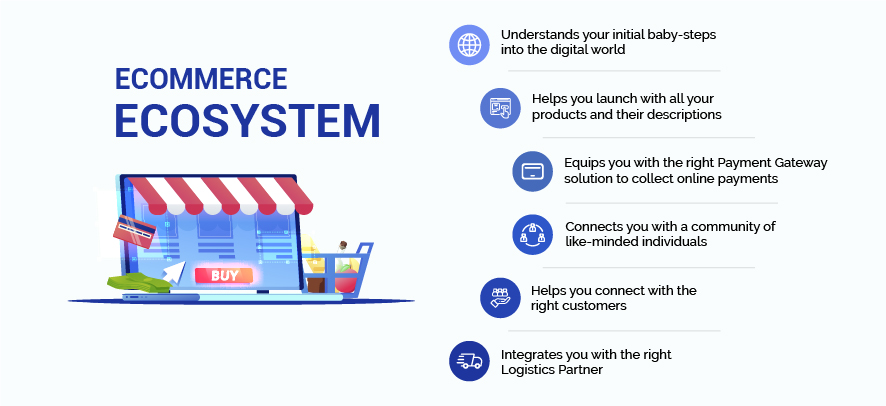Saudi Arabia is in the midst of a profound economic and social transformation, spearheaded by the ambitious Vision 2030 roadmap. A central pillar of this vision is the acceleration of the digital economy, and within this, E-commerce in KSA stands out as a sector experiencing explosive growth and redefining the retail landscape.
This isn’t merely a market trend; it represents a fundamental shift in consumer habits and business models, offering fertile ground for both established enterprises and innovative startups.

The Growth Engine: Market Size and Key Drivers
The scale and speed of expansion in E-commerce in KSA are truly remarkable. While exact figures can fluctuate between market reports, consistent data points towards a market size that has grown significantly over the past few years, now valued in the tens of billions of US dollars. Projections for the coming years are equally impressive, with forecasts suggesting the market could easily surpass the $60 billion mark by the end of the decade. This trajectory is underpinned by several critical drivers.
Firstly, Saudi Arabia boasts exceptionally high rates of internet and smartphone penetration. A digitally connected population means a vast potential customer base is already equipped and comfortable with accessing online platforms. This widespread digital access is a non-negotiable prerequisite for a thriving online market and is a significant factor behind the success of E-commerce in KSA.
Secondly, the strategic focus of the Saudi government through Vision 2030 provides a powerful impetus. Extensive investments in digital infrastructure, including nationwide fiber optic networks and advanced 5G connectivity, are creating a robust backbone for online transactions and services.
Furthermore, the government has been proactive in implementing regulatory reforms designed to facilitate e-commerce, such as streamlining business registration processes for online ventures, enhancing consumer protection laws, and promoting secure digital payment frameworks.
Initiatives aimed at fostering digital literacy and supporting small and medium-sized enterprises (SMEs) in their digital transition are also crucial components, encouraging local participation and innovation in the E-commerce in KSA space.
Shifting Sands: Saudi Consumer Behavior Online
Understanding the dynamics of Saudi consumer behavior is paramount for success in the digital marketplace. The population is characterized by a large youth demographic that is inherently digitally savvy and quick to adopt new technologies.
Convenience is a major draw, with online shopping offering the ability to purchase goods 24/7, bypassing traditional retail constraints and the challenges of urban traffic. The perceived value proposition of E-commerce in KSA is also enhanced by the ability to effortlessly compare prices across various platforms and access a far wider selection of products than typically available in physical stores, including a rich array of international brands.
Mobile commerce (m-commerce) dominates the landscape, with the vast majority of online transactions conducted via smartphones. This necessitates mobile-first strategies for businesses, including optimized websites and user-friendly mobile applications. Social commerce is also deeply ingrained, with platforms like Instagram, Snapchat, and TikTok serving not just for discovery but as direct purchasing channels, heavily influenced by local influencers and content.
A significant and ongoing shift is the move away from the historically dominant Cash on Delivery payment method towards digital alternatives. The national Mada network is widely used, alongside international credit cards and the rapidly growing popularity of mobile wallets such as Apple Pay and STC Pay. This transition is critical as it enhances security, traceability, and convenience for both consumers and businesses, further solidifying trust in E-commerce in KSA.
Decoding Preferences: Popular Categories and Emerging Trends

Certain product categories have consistently performed strongly in the Saudi online market. Electronics, driven by a tech-enthusiastic population, remain a top segment. Fashion, encompassing both global brands and local traditional wear, also holds a significant market share. Hobby and leisure items have seen increased demand, particularly following periods where home-based activities became more prevalent.
Beyond these established categories, emerging trends are shaping the future of E-commerce in KSA. Online grocery and food delivery services have witnessed exponential growth, reflecting busy lifestyles and a growing preference for convenience.
Furthermore, increasing consumer awareness regarding sustainability and ethical consumption is beginning to influence purchasing decisions, driving demand for eco-friendly products, sustainable packaging, and businesses with responsible practices within the E-commerce in KSA market.
Navigating the Path: Challenges and Opportunities
While the potential is immense, the E-commerce in KSA market, like any rapidly growing sector, presents its own set of challenges. Logistics and last-mile delivery remain critical operational hurdles. Ensuring timely, efficient, and cost-effective delivery across a geographically diverse country, especially to remote areas, requires sophisticated supply chain management and investment in logistics infrastructure. Handling returns efficiently is another area that demands streamlined processes.
Despite the surge in digital payments, some consumers may still harbor concerns about online security and fraud. Building and maintaining consumer trust through robust security measures, transparent policies, and reliable customer service is paramount. The competitive landscape is also intensifying with the presence of major global players like Amazon and Noon, alongside a growing number of local and regional platforms.
However, these challenges are fertile ground for innovation and opportunity. Investment in advanced logistics technologies, including warehousing automation and smart delivery routing, can address fulfillment challenges. Continuous efforts to enhance cybersecurity and educate consumers about safe online practices will build greater confidence.
The competitive environment encourages specialization and differentiation; opportunities exist in serving niche markets, offering highly personalized shopping experiences, and leveraging data analytics to understand and cater to specific consumer segments. Cross-border e-commerce also represents a significant opportunity, connecting Saudi consumers with a wider global product offering.
Moreover, government support and initiatives specifically targeting SMEs entering the digital space provide a pathway for local businesses to thrive by offering unique products and culturally relevant services.
Building the Foundation: The E-commerce Ecosystem

The success of E-commerce in KSA is not solely dependent on individual businesses but also on the strength and maturity of the supporting ecosystem. This includes reliable logistics providers capable of handling everything from warehousing to last-mile delivery, secure and user-friendly payment gateways that support diverse methods, and a growing pool of digital marketing and technology service providers.
Building a robust ecosystem requires ongoing collaboration between government entities, established corporations, startups, and educational institutions to foster innovation, develop necessary skills, and create a supportive regulatory environment. Localization, extending beyond language to encompass cultural nuances in marketing, product selection, and customer service, is also crucial for building strong connections with the Saudi consumer base and ensuring sustained growth in E-commerce in KSA.
The Future is Digital: Outlook for E-commerce in KSA
In conclusion, E-commerce in KSA is on an undeniable upward trajectory, poised to become a cornerstone of the Kingdom’s digital economy. Driven by a tech-forward population, strategic government support, and evolving consumer preferences, the market offers significant opportunities for growth and innovation.
While challenges related to logistics, trust, and competition require careful navigation, the overall outlook remains exceptionally positive. As Saudi Arabia continues its journey towards a diversified and digitally driven future, E-commerce in KSA will undoubtedly play an increasingly vital role in shaping its economic landscape and consumer experience.
From Afia Digital’s vantage point, the E-commerce in KSA market presents a compelling narrative of rapid digital advancement and significant economic potential. Driven by a clear national vision, a young and digitally empowered population, and continuous infrastructure development, the market is poised for continued and substantial growth.
While operational complexities and the competitive landscape require strategic attention, the foundational elements for success are robust. As Saudi Arabia continues its journey towards a diversified and digitally centric future, the pivotal role of E-commerce in KSA as a catalyst for economic growth, innovation, and enhanced consumer experiences will only become more pronounced, offering exciting prospects for businesses that are prepared to invest in and adapt to this dynamic digital frontier. Sources and related content










